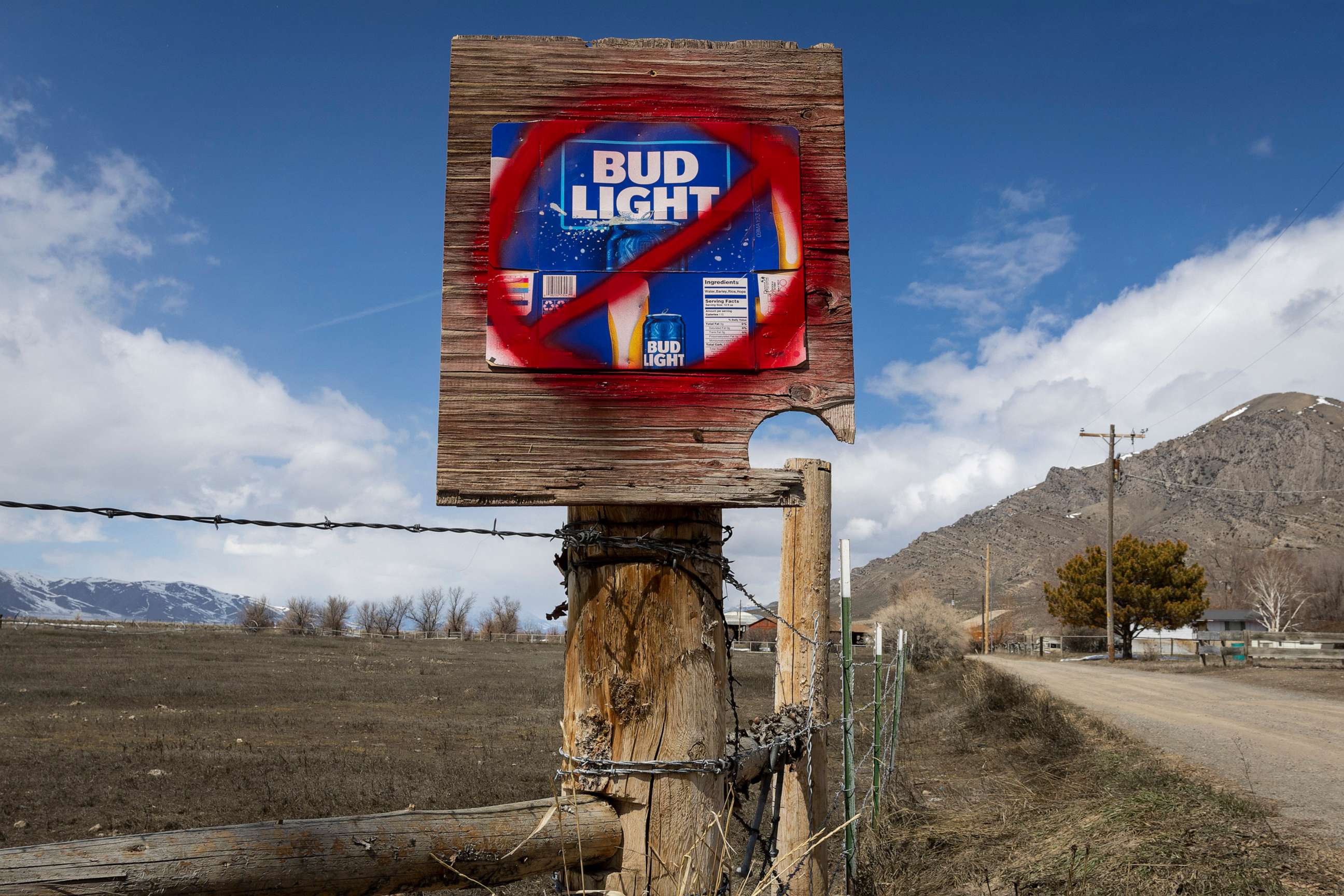'Thrown in their faces': Bud Light salespeople say boycott is hurting commission
Salespeople promoting Bud Light for a Florida–based distributor have grown accustomed to car horns, middle fingers and jokes amid a weekslong boycott, but say they have struggled to ignore thousands of dollars in lost commission pay, two sales supervisors at the distributor told ABC News.
A typical salesperson at the distributor made roughly $2,000 less in May than he or she would have over each of the previous two years, suffering primarily from a decline in Bud Light sales that reached as much as 60% over the week ending on Memorial Day, the sales supervisors said.
"This has really, really killed a lot of the guys who are commission-based. That's who it's really hurting," one supervisor said. "There's nothing they could've done -- this was thrown in their faces."

A consumer boycott of Anheuser-Busch InBev over a promotion in April from a trans influencer has pummeled the company's stock, but it has also brought financial pain for thousands of salespeople at independent distributors nationwide, many of whom depend largely on performance-based pay, former Anheuser-Busch InBev executive Anson Frericks told ABC News.
Sales of Bud Light have recorded declines for seven consecutive weeks after a product endorsement from Dylan Mulvaney, a transgender influencer, sparked backlash among many conservatives.
The boycott gained momentum, meanwhile, after the initial response from the company was perceived as conciliatory by some LGBTQ advocates, prompting frustration on the left.
Those losses have slashed the income of salespeople who work for roughly 500 independent wholesalers that sell Anheuser-Busch beverages to restaurants, bars and grocery stores, according to interviews with two distributors, two sales supervisors and Frericks.
The sales supervisors and distributors declined to share their names because they didn't want to be publicly identified speaking about the financial consequences of the boycott.
Compensation for salespeople differs widely between different distributors, but a typical salesperson makes about $60,000 a year, including $20,000 in variable pay that depends largely on commission, said Frericks, who left Anheuser-Busch InBev last year.
"Good people are going to start leaving because they aren't making money," Frericks told ABC News.
On an earnings call last month, Anheuser-Busch InBev CEO Michel Doukeris acknowledged the strain that the boycott has placed on workers in the field.
"This situation has impacted our people and especially our frontline workers: The delivery drivers, sales representatives, our wholesalers, Bud owners and servers," Doukeris said.
"These people are the fabric of our business. They are our neighbors, family members, and friends. They are in every community in America," Doukeris added. "We've been doing everything we can to support our teams."
Anheuser-Busch said in a statement to ABC News that the boycott has had an impact but they remained committed to bringing people together.
"Anheuser-Busch employs over 18,000 people and our independent wholesaler partners have an additional 47,000 valued colleagues. The current situation has impacted our people and especially our front-line workers including delivery drivers and sales representatives. These people are our neighbors, family members and friends. They are in every community in America. As we move forward, we will continue doing everything we can to support our teams while working tirelessly to do what we do best - bringing people together over a beer," the statement read.

Sales of Bud Light across the U.S. fell nearly 26% over the week ending on May 20 compared to the same period a year ago, according to data from Bump Williams Consulting and Nielsen NIQ reviewed by ABC News.
At an Anheuser-Busch distributor in the Midwest, nine salespeople rely on commission for roughly two-thirds of their pay, the president of the distributor told ABC News.
The salespeople sustained overall sales declines in May of between 6% and 26% compared to the same month a year prior, which translates into losses ranging from $200 to $900, the president added.
At a meeting with the salespeople earlier this month, the president told them, "None of this is your fault and none of this is my fault," he recounted. He vowed to pay them each a lump sum that would put their income for last month at or above where it would have stood without the losses.
"I'm frustrated that this has [dragged] on as long as it has," the president of the distributor said. "I'm hopeful that we're moving in the right direction."
Anheuser-Busch InBev also provided financial support for frontline workers at independent distributors, Doukeris said on the earnings call last month. The company provided $500 for each employee and additional ad spending last month, the Wall Street Journal reported.
To be sure, some Anheuser-Busch salespeople at independent distributors depend on little or no sales commission.
The owner of a different distributor in the Midwest said the company previously paid salespeople entirely on commission but stopped the practice in recent years because sales varied significantly between the strong summer months and weak winter ones.
"My employees haven't been hurt that bad on it," the owner said, referring to the boycott.
Maurice Schweitzer, a professor at the University of Pennsylvania's Wharton School of Business who studies consumer movements, said the losses for some salespeople at Anheuser-Busch distributors mark an unanticipated result of the consumer boycott.
"This has a disproportionate effect on a handful of people who had little or nothing to do with the decision that triggered people to be upset," Schweitzer told ABC News. "It has this cascade of unintended consequences."




